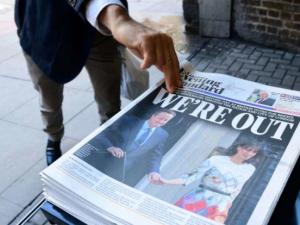Short Description
The decision by British voters to take a leap into the unknown by severing ties with the European Union is by no means a reliable predictor of the eventual outcome of the presidential election in the United States. But neither was it an event without larger meaning.
If anyone still needed a reminder that the phrase “it can’t happen here” should be struck from the lexicon of 2016, Britain’s historic Brexit referendum provided one more dramatic piece of evidence. The question is how Hillary Clinton and Donald Trump and their allies interpret the results of what did happen here.
The decision by British voters to take a leap into the unknown by severing ties with the European Union is by no means a reliable predictor of the eventual outcome of the presidential election in the United States. But neither was it an event without larger meaning.
Frustration with political elites knows no borders today. There are signs of it across Europe, just as there have been signs of it in the United States in recent campaign cycles. What erupted here this week is stirring elsewhere. It has defied conventional thinking and disrupted conventional analyses. Who’s to say there are no more significant shocks ahead?
Here’s one example of a connection between what happened in Britain and the rise of Trump in the United States: In Britain, nearly the entire political establishment was aligned in favor of staying in the European Union. The “remain” campaign was in some measure an effort by these political elites to scare rank-and-file voters with dire forecasts about what a post-Brexit economy might look like that included threats of spending cuts and higher taxes.
But when voters went to the polls, in a huge turnout, they either weren’t afraid of those forecasts or didn’t believe what they had heard because they had given up on the political leaders of their country. In either case, it was an explicit rejection of what they were being told and an embrace of their own instincts and personal experiences.
How does that relate to the presidential campaign? Ask Peter Hart, the Democratic pollster who has been conducting focus groups of Republicans, Democrats and independents in this and previous campaign cycles under the auspices of the Annenberg Public Policy Center of the University of Pennsylvania.
Outside Pittsburgh last week, he assembled a group of voters who fit the model of potential supporters of Trump. The session came after Trump had experienced a series of self-inflicted wounds — bad enough, Hart believed, to give people pause about supporting the New York billionaire.
What he found instead were people who were far more forgiving than he had expected. They were willing to ignore or dismiss his gaffes, to explain away his mistakes and to focus instead on something he did that they liked. “It just shocked me,” he said.
The Brexit vote is the kind of event that should make both the Clinton and Trump campaigns pause and take notice. As they began to respond Friday, it was clear that both had seized on aspects of the British result that reinforced some of their basic instincts.
Clinton issued a carefully worded statement respecting the decision of the British voters to break with the E.U. while restating the importance of the long-standing relationship between the two allies. She also said this as a way of trying to discredit her opponent: “This time of uncertainty only underscores the need for calm, steady, experienced leadership in the White House to protect Americans’ pocketbooks and livelihoods, to support our friends and allies, to stand up to our adversaries, and to defend our interests.”
read more at
http://english.aawsat.com/2016/06/article55353385/brexit-vote-sends-message-politicians-everywhere-can-happen






![نصيحتي لك: اذكر الله [1 / 12] نصيحتي لك: اذكر الله [1 / 12]](https://www.islamstory.com/images/upload/content_thumbs/1913613138ragheb-al-serjany-videos.jpg)


Comments
Send your comment